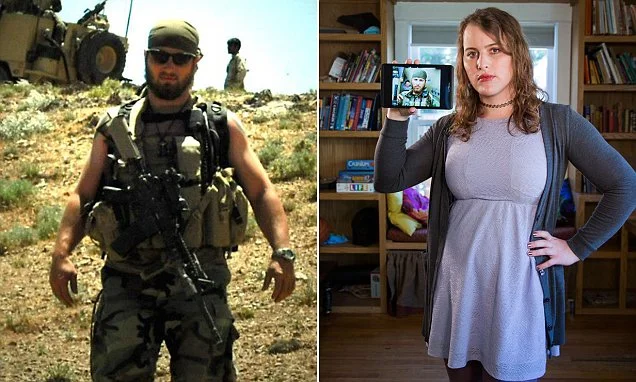Alana McLaughlin’s Background
Alana McLaughlin is a former member of the U.S. Army Special Forces and a current MMA fighter. She was born in 1982 or 1983 and grew up in West Columbia, South Carolina. Her family was fanatically religious and poor. McLaughlin was small and feminine, which put a target on her back at school. Her family frequently tried to make her more masculine, placing her into conversion therapy.
McLaughlin joined the U.S. Army Special Forces in 2003 at the age of 20. By 2007, she was a medical sergeant, deployed to Afghanistan as part of a 12-person unit. She treated IED casualties and even performed amputations under a doctor’s supervision. Her peers were wrestlers and Golden Gloves boxers. After six years of service in the military, McLaughlin decided not to re-enlist. Throughout her career, she earned eight distinguished service medals.
After leaving the army in 2010, McLaughlin began her gender transition. She made her debut fight in Miami at Combate Global on September 10, 2021. She is the second openly trans woman to have fought professionally in MMA. She won her debut fight by with a rear-naked choke in the second round. McLaughlin trained with MMA Masters – a gym in Hialeah, Florida – prior to the bout.
Her journey from male to female
Born and raised in a religious family in West Columbia, South Carolina, McLaughlin knew from a young age that she identified as female. Despite her family’s attempts to make her more masculine, including sending her to conversion therapy, McLaughlin didn’t change her mind.
In 2003, at the age of 20, McLaughlin joined the U.S. Army Special Forces, viewing it as the ultimate conversion program. She served her country for six years, earning eight distinguished service medals. However, after deciding not to re-enlist, she moved north and completed her fine arts degree at UNC-Asheville in 2015.
In early 2016, the opportunity to surgically transition presented itself, and McLaughlin seized it. This marked a significant milestone in her journey, allowing her to align her physical appearance with her gender identity. Despite the challenges she faced, including societal prejudice and vitriol, McLaughlin remained steadfast in her journey.
Alana McLaughlin’s MMA debut
Alana McLaughlin made her MMA debut against Celine Provost at Combate Global Episode 19 in September 2021. She was the second openly trans fighter in MMA history, following Fallon Fox, who was also in attendance for the fight.
In the first round, Provost was the early aggressor. She created distance and traded punches with McLaughlin. Provost’s right hand found the mark multiple times, wobbling McLaughlin. Despite this, McLaughlin managed to land a strong right hand of her own.
The second round saw a shift in momentum. McLaughlin bounced back, hurting Provost early on before landing a takedown. Although Provost quickly reversed the position, McLaughlin capitalized on the opportunity to sink in a rear-naked choke. This technique, also known as a rear naked choke-hold, is a submission technique that applies pressure to the neck and can lead to unconsciousness if not released.
With just over two and a half minutes left in the round, McLaughlin shot for another takedown and brought Provost to the ground. Provost closed up her guard, but McLaughlin was able to secure the rear-naked choke, leading to her victory. The fight ended with McLaughlin winning by submission at three minutes, three seconds into the second round.
This fight stirred up controversy and sparked a debate about the inclusion of transgender athletes in combat sports.
Controversy
The debate primarily centered around the fairness of transgender women athletes competing against cisgender women athletes.
Critics argued that McLaughlin, being a former member of the U.S. Army Special Forces and having transitioned from male to female, might have physical advantages over cisgender women. Some critics expressed their concerns on social media, with comments ranging from calling McLaughlin a “cheater” to stating that society has fallen because “men [are] beating bloody and choking women”.
McLaughlin defended herself against these criticisms. She posted a message on social media stating, “Good morning, friends, supporters, and others! I’m getting a lot of variations of the same nasty messages calling me a cheater like I didn’t just get beat on for a round and a half. Y’all need to show Celine Provost some respect and take your concern trolling elsewhere”.
Even within the MMA community, opinions were divided. Notably, UFC color commentator Joe Rogan, who initially did not support the idea of transgender women fighting cisgender women, altered his views on the subject. He stated that he only had problems with transgender fighters who hide their past and that he was fine with cisgender fighters willing to take on transgender opponents.
The controversy surrounding McLaughlin’s win highlights the ongoing debate about the inclusion of transgender athletes in sports. It raises important questions about fairness, equality, and respect for all athletes, regardless of their gender identity.
Alana McLaughlin’s Response
Alana McLaughlin responded to the controversy surrounding her win with grace and resilience. She addressed her critics directly on social media, particularly those who accused her of having an unfair advantage as a transgender woman.
In response to former MMA fighter Jake Shields, who attempted to misgender and demean her on Twitter, McLaughlin tweeted back: “Lol Jake has a crush. Sorry sweetie, you started off on the wrong foot”. This response was met with support from Twitter users who corrected Shields’ controversial outbursts.
McLaughlin’s responses highlight her strength and determination in the face of adversity. They also underscore the importance of respect and understanding in discussions about transgender athletes.
